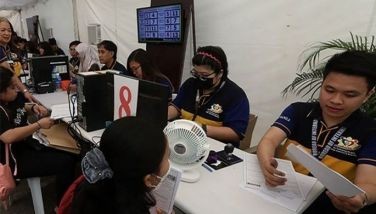Think tank sees soft landing for Philippine economy
MANILA, Philippines — Amid the slowdown in the global economy, a soft landing can be expected for the Philippines this year, UK-based Oxford Economics said in a research brief yesterday.
For the country, this entails a transition from a fast growth trajectory to a slower or flat growth path while avoiding recession. The macroeconomy research firm attributes this to the resilience of the economy and less internal risk compared with other emerging economies.
“Most emerging markets have reasonable prospects to secure a soft landing, even if external conditions deteriorate,” said Oxford Economics.
“Our soft landing scorecard suggest India and the Philippines are the most secure, and Argentina and South Africa the least,” it added.
As the global economy enters its third slowdown since 2010, the firm said its cyclical indicator suggests a slowdown is still more likely than a recession.
“While some recent shocks are still working their way through the system, the negative momentum looks insufficient to tip the world into recession — that would require further major shocks or policy errors,” Oxford Economics said.
The firm noted that recent tightenings in monetary policy worldwide has raised the risk of recession but this is balanced by less stress in emerging markets, “less severe” rise in oil prices, and low inflation.
“It may be premature to declare the onset of happy days for the global economy, but our trawl through the various drivers of weakness over the last year or so suggests the worse is behind us,” it said.
It noted that policy stimulus in China is already showing signs of increased lending and the euro zone economy is showing signs of improving.
Emerging economies that include the Philippines were assessed based on a soft-landing scorecard based on five individual measures: economic resilience, exchange rate sensitivities, past policy over-tightening, trade openness and internal risk.
The measures were scored one up to five with five as the highest score, suggesting the least risk for a hard landing, which leads to recession.
Among the indicators, economic resilience weighed the most (55 percent weight), exchange rate sensitivities (10 percent weight), past policy overtightening (five percent weight), openness to trade (20 percent weight), and internal risk (10 percent weight).
In the scorecard, India had the highest final score of 3.45 while the Philippines had the second highest at of 3.44.
Across indicators, the country scored between three and four. The resilience of the domestic economy and less internal risk figured most prominently with scores of four for both measures.
“Most major emerging markets appear to be in a reasonably strong position based on this metric, with India, the Philippines, Poland and Hungary being the most robust,” said Oxford Economics.
The score of four for past policy overtightening also indicated that monetary authorities responded to inflation with just enough tightening of monetary policy.
Oxford Economics said the policy tightening seen across emerging economies for the past two years “does not seem to be a major concern.”
The country performed weaker in exchange rate sensitivities and trade openness with scores of three for both.
Other countries covered by the scorecard were China, Indonesia, Poland, Hungary, Colombia, Chile, Peru, Russia, Thailand, Malaysia, Brazil, Turkey, Mexico, South Africa and Argentina.
- Latest
- Trending






























